- Home
- Jason Matthews
The Kremlin's Candidate Page 5
The Kremlin's Candidate Read online
Page 5
In one blink, DIVA would have access to all SVR secrets; would automatically claim a seat at the National Security Council; and would become a fledgling member of the siloviki, Putin’s gaggle of insiders with access to not just secret plots roiling the halls of the Kremlin, but also the plans and intentions of the circumspect and coy Vladimir Vladimirovich, whom many foreign observers had analyzed, but few genuinely knew.
“It helps, not hurts. When I acquire intelligence assets, it raises my stock,” said Dominika to Nate, sopping up tomato sauce with a crust of bread. “No one in that crowd besides Bortnikov of the FSB, the internal service, recruits foreigners. The president was a KGB officer; he appreciates the accomplishment.”
“But there’s added risk,” said Nate. “If word leaks out, for instance, that CIA knows the North Koreans are using US railgun technology, you’re immediately compromised as the obvious source. Moscow’s got too many ears in Washington.”
Dominika poured two more glasses of wine. “If your people cannot keep secrets, perhaps I should not tell you secrets.”
“That’s a fine solution,” said Nate.
“Well, then tell Benford to prosmatrivat the information, how do you say it?”
“Compartment the intelligence,” said Nate, who was fluent in Russian. “In Washington that means only a thousand people will read your reports—the air force, navy, Department of Energy, ODNI, DIA, NSC, FBI, and half the committees on Capitol Hill. We have a single leak, you’d be on the Center’s short list of suspects in a week.”
“And then I suppose you’d get your wish for me to defect,” said Dominika, smiling. From the beginning, for seven years, she vowed that she’d never accept exfiltration. She was spying to save her Russia, and nothing else mattered, she would not contemplate fleeing. Nate knew the higher she rose in the SVR, the more exclusive her reporting would become, and the more likely she could be compromised by a leak from Washington. She had to keep a low profile, and CIA had to increasingly obfuscate that she was the source of exceptional reporting.
To the extreme annoyance of Benford, Nate had been preaching for a year that they should exfiltrate Dominika before she was compromised. She’d had two close calls, and once had even been interrogated in Lefortovo prison after an operational flap. She’d survived that ordeal and been cleared, but Moscow teemed with counterintelligence bloodhounds, jealous rivals, and political enemies who would relish destroying a competitor, especially the lissome Egorova, the rising star. Nate argued that losing her would be a dereliction of their duty to keep her safe, and it would be debilitating to future CIA recruitments worldwide. Plus, even in safe retirement, she would be an invaluable observer and a useful operational adviser.
Gable and Forsyth disagreed with Nate, but provisionally understood, having themselves extracted blown agents before. But Benford was furious that Nate was rocking the boat and distracting the asset with his mewling arguments. Simon was old school: run your assets and gather the intel until the bitter end, then extract them, if possible. If the agent got the chop, it was the hard reality of operations. Benford’s operational catechism was codified in an age when an agent could climb over the Berlin Wall, or wait for a rubber raft on a Baltic beach to escape the Iron Curtain. Now moles were caught in cyberstings and by drone surveillance and facial-recognition software. The tenets of espionage were immutable—go forth and steal secrets—but technology was changing the Game.
It didn’t help that Nate, despite an unreal gift for denied-area ops and surveillance detection, was the junior officer in the quartet of officers who oversaw the DIVA case, and thus, despite the tradition of civilian informality in CIA that belied its wartime military OSS roots, should have known to speak only when spoken to. They all knew Nate was spoony over Dominika and dreamed of settling down with her behind a white-picket fence. But the DIVA case was too valuable to consider pulling the plug. Gable advised Nate with characteristic candor.
“Listen up, rookie,” he said. “You recruited her cuz she had access. Now her access may reach all the way to the top. You pitched her and put her in harness. Now you’re her handler, and it’s all on you. You use everything in your limited bag of tricks to keep her alive and productive. Everything. Anything. But she’s an asset and you run her like a pro, got it? Now go put on your big-boy pants and shut the fuck up.”
* * *
* * *
Dominika took the dishes in, came back out, and sat on his lap. “I don’t want you to worry,” she said. “There will be hundreds of people in Moscow who will read the same reports I give you, providing plenty of cover. And I’ll be the one investigating any leaks; I will be the Russian Benford!”
Nate shook his head like a dog. “You’re saying that I’m sleeping with the Russian Benford? Better get off my lap. The image will stay with me for months, maybe years.”
Dominika laughed and ignored him. “I will travel quarterly to Vienna to debrief Academician Ri. My Sparrow Ioana is relocating there to be close to him, to keep him calm, and to rent a place nearby where we can meet. We can discuss the case and you can lecture me, and I will continue to, how do you say it, straighten you out? Vypravlyat?”
“You’re going to straighten me out?” said Nate, pulling her close. “I’m the handler here. I’m sure you remember.”
“In some circumstances I become the handler,” said Dominika, lifting his T-shirt over his head. “And yes, I will straighten you out.” She deftly pulled the drawstring of his trousers, lifted her skirt, and sat back on his lap, wiggling to seat herself more deeply on him. “Are you straightened out?” she whispered. She rocked back and forth, moaning softly, Nate’s face buried in her bosom. Then the dried-out, flimsy wicker chair fell apart, dumping them on the still-warm marble of the warped little balcony. Farther north, the gods on Mount Olympus looking down from above the alluvial pans of Thessaly might have said this was a portent of things to come.
They moved onto the bed, laughing, Nate holding a bruised elbow. Dominika rested her head on his shoulder. It had been a short time together, yet she was full of bien-être, a contentment, a tender proximity with Nate that she had not felt during other hurried and dangerous meetings. Perhaps it was the brassy Aegean sun, the salt air, and lying in bed with him, smelling his body and the wisterias and watching the hummingbirds. Nate laughed as Dominika scolded them in Russian, showing the little birds the correct technique for drawing nectar from a stamen; halfway through her demonstration he had stopped laughing and was bucking his hips off the mattress. The bullfrog horn of the night ferry from Rhodes bellowed congratulations from the sea.
Dusk. Surcease. The kerosene lantern attracted a giant emperor moth, silver wings printed with spots as luminous as owls’ eyes, and it dive-bombed around the flame, casting shadows as big as bats on the walls. Dominika propped herself on one arm and Nate made her repeat the next contact skeds for Vienna in a month, with preliminary and secondary meeting sites, recognition paroles and countersigns, alternates and safety signals, including brush passes with Ioana, who would be a cutout. This would be an important follow-up debrief to hear more about the Noko nuke program, and see if they could develop any identifiable information on the US source of the technology leak.
“I wish you would let someone else meet the Korean in Vienna,” said Nate, worrying the bone one last time. “Surely you can designate another officer, someone who speaks Korean or someone who knows weapons design.”
“We talked about this for two days,” said Dominika. “Why would I do that? It would be illogical. I told you this will help me politically. I’m more likely to receive the promotion that Putin—”
“—You won’t get the promotion if you’re in the cellars of Butyrka with a strap around your neck, all because of this obsession with revenge and this stupid jihad you’re waging against them all. You’re poised at the pinnacle. You’re too stubborn to realize that you can hurt them a hundredfold by just being Director SVR and keeping a low profile.”
He felt her st
iffen beside him. Dominika got out of bed, wrapped a cotton skirt around her naked body, and started stuffing her few belongings into a shoulder bag.
Nate recognized the flashing eyes and flared nostrils. “Where are you going? We’re leaving tomorrow morning,” he said.
“Jihad? Obsessed? Stupid?” shouted Dominika. “That is what you think of me, of what I am doing? Zhópa, asshole. I’ll die for my country before I sit still and watch them rob us blind. Thank you for your predannost.”
“What are you talking about? I’m devoted to you more than anyone. I want you to survive.”
“By giving up and running? Poshël ty, piss off! I’m catching the bus to town.” She jammed her feet into flats and slung her bag over her shoulder.
Nate got out of bed. “It’s pitch-black out there. You’ll walk off a ledge in the dark. Let me get a flashlight.”
“Ischézni, get lost,” she yelled and slammed the door and started crunching down the goat path in the dark. Nate threw on pants and flip-flops, grabbed a flashlight, and ran to catch her. She was crying silently as he held her arm and shined the light at their feet. She wouldn’t look at him as they stood in the dark under an olive tree waiting for the late 122 bus, which eventually wheezed around the bend in the road and pulled to a stop. As the doors swung open, Nate expected to see Gable driving and Benford sitting disapprovingly in the back row.
“Call when you arrive in Vienna,” said Nate as the doors hissed shut in his face. The bus ground out of sight toward Glyfada, where she would take a taxi to her embassy.
She’s changed in the last few years. Hotheaded and impossible. Uncontrollable as an agent, and sure to get caught soon. Some clandestine meeting. Some agent handling. Some Romeo. He could hear Gable already. “Congratulations, rookie, you just hit bottom and started digging.”
* * *
* * *
Langley. They were gathered in the small, chaotic conference room of Benford’s CID, Counterintelligence Division, the gray fabric-covered (and soundproof) walls of which were adorned with a row of framed photographs of previous Chiefs of CID in an unsettling chronological sequence, all the way around the room, like a ghoulish martyrs’ wall in a Christian catacomb. Photos from the sixties were sepia-toned, with forgotten Ivy Leaguers in thin ties (JFK years). Kodachrome photos from subsequent decades depicted CID chiefs with hipster sideburns and vapid smiles (Carter); expressions of guilty calculation (Nixon); and the thousand-yard stares of hemispheric liberators (Reagan). The final digital photos were of the modern generation of CID chiefs with expressions of mystified alarm (Clinton, Bush). At the end of the row hung the photograph of the most-recently retired CID director during the modern era, a chuff famous for his implacable conceit. The US flag in the room had with malice been moved partially in front of this photo, so only a single eye of the fomite peered around the fabric, rendering him even creepier in memory than he had been in person. There was no remaining wall space for any additional frames of future ex-chiefs, and rumors of commissioning a ceiling fresco depicting a cherubic, bare-assed Benford with a tiny bow and arrow were, up until now, unsubstantiated.
Like all of Benford’s personal spaces, the conference table was messy, cluttered with paper, coffee mugs, and a doughnut box. Rolled-up maps were stacked in a corner, and a projection screen was torn down the center and patched with duct tape. Two shattered flat-screen monitors were discarded in the far corner of the room, along with the shards of a US Navy coffee mug, which almost certainly had been the projectile that had destroyed at least one of the monitors. Benford, Gable, Forsyth, and Nash were at one end. Hearsey, the tall ectomorph tech chief, came in with two notebooks and sat at the far end. Rugged, rangy, and leather tough, Hearsey looked like someone who should be on the prairie mending barbed-wire fence or using a Burdizzo Emasculatome on bull calves, instead of spending a year in a lab concocting a chemical acid fog—sprayed at night by stealth drone—to embrittle North Korean missile gantries, or developing wrist-worn fitness monitors molded out of Semtex that could be detonated in Dubai from a laboratory in Maryland. An engineer by training, Hearsey knew about railguns, plus he didn’t take guff from Benford, and Gable liked him, so he was read into everything, including the DIVA case.
He was known in the Agency simply as Hearsey—only the mavens in personnel knew his given name was Gayle, and they never revealed anything. Hearsey looked around Benford’s squalid conference room, ran a finger across the crumb-covered table, and contemplated the surrounding detritus.
“I thought the Hindenburg crashed in Lakehurst, New Jersey,” said Hearsey, who could get away with being a wiseass. Benford blinked once.
Sitting at the other end of the table taking notes was Benford’s new assistant, Lucius Westfall, a WMD analyst transferred from the Directorate of Intelligence to the Directorate of Operations, one of scores of CIA Director-mandated sabbaticals designed to forcefully integrate DI analysts with DO operators, which was in most cases like partnering the pastor’s daughters with bargees at a barn dance.
Westfall was blond, thin faced, with wire-rimmed glasses that tended to fog when he spoke publicly or talked to pretty women. It was demanding enough to work for Simon Benford, but Westfall constantly had to decode the aboriginal patois of the Operations Directorate. These ops officers were unintelligible when incessantly talking about bumps, dangles, peddlers, old whores, burn notices, drops, caches, headhunters, scalps, dry cleaning, rabbits, chicken feed, barium enemas, 201s, PRQs, natural reverses, flipping, fluffing, fluttering, and a million other mysteries. As terrifying, Westfall had to weather the depredations of the hulking Marty Gable, who Westfall was convinced had once been a serial killer from Kansas.
“Make sure you take good notes, Luscious,” said Gable, mispronouncing his name with a fake French accent. Gable’s particular style of mentoring a newbie colleague fell somewhere between drill instructor and a chariot driver in the hippodrome. Gable ironically had himself also been dragooned from his rough-and-tumble Africa Division to be Benford’s unlikely deputy. CID was a spooky counterintelligence shop typically staffed with brilliant, quirky introverts who worked in the dark with the shades drawn. Outsiders called it the Island of Broken Toys. Benford wanted Gable less as a substantive deputy, and more as someone who could solve unstable, delicate foreign crises wherever they developed, a function Marty demurely characterized as “breaking the dishes.” DIVA also idolized Gable—he could talk her down out of the tree when she went into her increasingly more frequent conniptions about commo, risk taking, and security.
Benford gaveled the meeting to order with the solemnity for which he was known in Washington, London, Ottawa, Canberra, Bonn, Paris, Rome, and Tel Aviv, by slamming a file folder on the table, with his trademark invocation.
“Jesus Fucking Christ. If DIVA’s intel is right, we have a fucking fuckwad selling fucking secrets on the rail-fucking-gun to North Korea.”
Just back from Athens, Nash read off a paper. “DIVA just reported by SRAC this morning. The SVR has encrypted this North Korean Professor Ri Sou-yong PECHKA, which means ‘furnace’ in Russian,” he said.
Gable grunted. “Furnace, huh? A dictionary would take up less space and wouldn’t eat all the doughnuts,” he said.
Nate slid the box of glazed doughnuts across the conference table. “You’re welcome,” said Nate. “I bought the doughnuts for everyone, thought it would be okay to eat one.”
Gable lifted the lid of the box. “You buy doughnuts and you don’t even bring an assortment? No chocolate? No jelly?”
Benford stirred in his chair. “Can we concentrate on what appears to be the transfer of US Navy electromagnetic railgun technology to the North Korean nuclear program?”
Forsyth put down a copy of DIVA’s report. “How did the Nokos get this technology?” said Forsyth. “The RGB can’t tie their own shoes. All they normally do is shoot coup plotters inside their own country. You’re telling me they’re running an American source in-country? No way.”
&nbs
p; “Someone’s passing the technology,” said Hearsey. “The translated Korean document DIVA provided has verbatim US terminology: ‘conduction path,’ ‘ionized gas,’ ‘compact pulsed power.’ The Nokos aren’t coming up with that on their own.”
“Got to be Beijing,” said Gable. “I bet the MSS popped some California peacenik working in a navy lab who’s dedicated to trans-Pacific harmony; or a zit-faced contractor in DOD who wants a Corvette; or a weapons officer on board a frigate who’s in love with a Chia Pet from Shanghai who’s keeping his personal railgun on pulsed power.”
Westfall squirmed in his seat. Benford saw it and pointed at him. “Westfall, you have a view on the issue?” Gable slid the doughnut box down the table, as a collegial encouragement to speak up. Westfall let the lid of the box drop when he saw Gable had eaten the last two doughnuts and the box was empty.
“I don’t think Beijing wants Pyongyang to have the bomb,” Westfall said. “The Chinese think they still control the Nokos with food shipments and military aid. They like that the West comes begging for help in moderating North Korean behavior. And they ultimately know that once Pyongyang has a reliable nuke and a delivery system, their pit bull has slipped the leash, and is likely to do anything. Even against them. I looked it up: flight time of a basic Rodong-1 ballistic missile for the eight hundred kilometers from Sohae satellite launch center to Tiananmen Square is about five minutes, not even time for the politburo to kiss one another good-bye. Nope, China doesn’t want them to have the bomb.” There was silence around the table. The kid wasn’t dumb.

 Shep Dreams of Home
Shep Dreams of Home Extreme Skiing and Psychedelic Mushrooms: The Art of Chasing Fear
Extreme Skiing and Psychedelic Mushrooms: The Art of Chasing Fear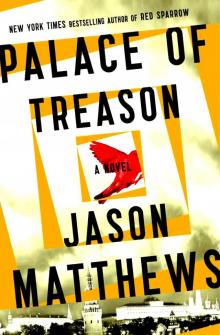 Red Sparrow 02 - Palace of Treason
Red Sparrow 02 - Palace of Treason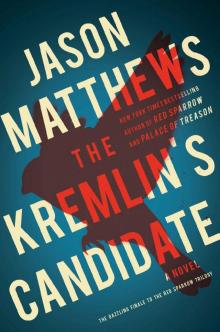 The Kremlin's Candidate
The Kremlin's Candidate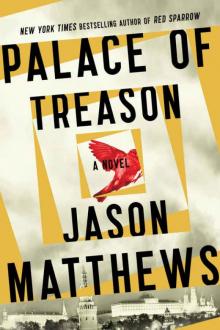 Palace of Treason
Palace of Treason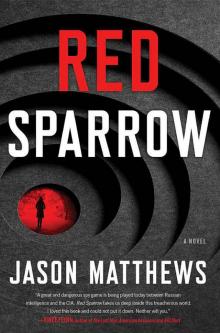 Red Sparrow
Red Sparrow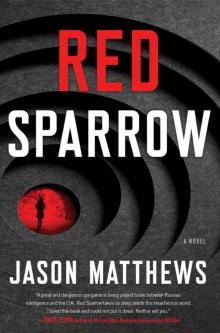 Red Sparrow: A Novel
Red Sparrow: A Novel